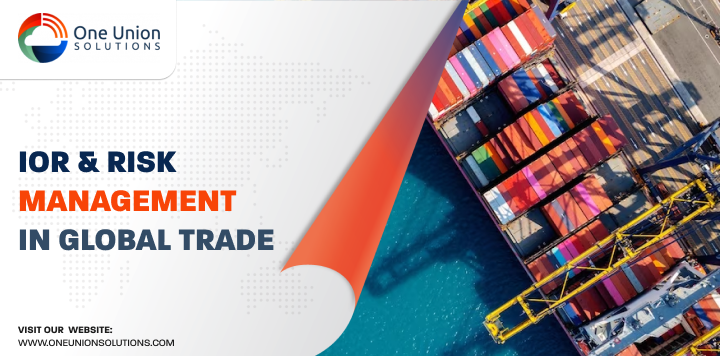In the world of international trade, the Importer of Record (IOR) is crucial since they are in charge of adhering to customs laws and paying related taxes and levies. IORs serve as vital pillars in the complicated web of global trade, facilitating smooth transactions and adroitly managing regulatory nuances.
IORs are crucial in risk management since they help to reduce possible risks associated with international commerce. Acting as gatekeepers, they examine every step of the importation procedure to spot and resolve any possible hazards, from logistical difficulties to regulatory noncompliance. IORs protect against the potential financial, legal, and reputational risks associated with international trade transactions by closely monitoring documents, thoroughly screening suppliers, and putting strong compliance procedures in place.
Furthermore, the effectiveness of risk management tactics is heavily dependent on the skill and attentiveness of IORs. The robustness and stability of international trade operations are greatly enhanced by their skill in negotiating a variety of regulatory regimes and their deft use of risk mitigation strategies. IORs play a vital risk management role that goes beyond just facilitating imports and is essential to maintaining the integrity and sustainability of international trade networks.
Understanding the Core: IOR’s Integral Position in Risk Mitigation
Within the complex global trade environment, risk mitigation measures place a premium on the Importer of Record (IOR). IORs are essential for managing the intricacies of cross-border transactions since they operate as the link between foreign suppliers and regional regulatory regimes.
IORs play the fundamental role of gatekeepers in risk management, guaranteeing adherence to various legal frameworks and reducing any risks that might jeopardize the efficient movement of products. IORs protect against the financial, legal, and reputational risks associated with international trade operations by providing careful paperwork, doing extensive due diligence on suppliers, and skillfully managing customs processes. IORs’ primary responsibility is to proactively detect and manage risks at each stage of the importing process. IORs play a vital role in enhancing the resilience and sustainability of global trade networks through the implementation of strict compliance rules and the utilization of their specialized knowledge in navigating regulatory environments. To put it simply, realizing how important IORs are to risk reduction highlights how crucial they are to maintaining the stability and continuity of international trade activities in the face of a constantly changing global environment.
Minimizing Risks: IOR’s Role in Global Trade Risk Management
Risk Minimization: How IOR Plays a Pivotal Role in Global Trade
The Importer of Record (IOR), who focuses on reducing possible risks and guaranteeing the seamless movement of products across borders, is a key player in risk management strategies in the dynamic world of global trade. Acting as a liaison between foreign suppliers and regional regulatory bodies, IOR is charged with managing intricate compliance mandates and reducing a range of risks associated with cross-border transactions.
Ensuring that various regulatory contexts are followed is one of the main roles that IORs play in risk management. To reduce the financial, legal, and reputational risks involved in conducting business internationally, they carefully manage paperwork, thoroughly investigate suppliers, and maneuver through complex customs processes.
IORs also anticipate hazards and take proactive measures to mitigate them at each step of the importing process. IORs play a vital role in enhancing the resilience and sustainability of global trade networks through the implementation of strict compliance rules and the utilization of their specialized knowledge in navigating regulatory environments.
Essentially, the critical function that IORs play in risk reduction highlights how vital they are to maintaining the dependability, effectiveness, and continuity of international trade activities in the face of the complexity of the world economy.
Proactive Measures: IOR’s Approach to Minimizing Trade Risks
It is essential to risk management in international commerce since it guarantees regulatory compliance and reduces possible risks. IORs manage intricate customs processes and reduce a variety of hazards associated with cross-border transactions by acting as liaisons between foreign suppliers and regional laws.
To reduce the financial, legal, and reputational risks connected with foreign commerce, IORs are charged with thorough paperwork and supplier due diligence. They support the robustness and sustainability of international trade networks by proactively recognizing and mitigating risks at every level of the importation process.
Establishing strict compliance procedures and making use of their regulatory landscape navigation experience are among their primary duties. This proactive strategy improves the dependability and effectiveness of international trade operations in addition to ensuring conformance to a variety of regulatory settings.
The critical role that IORs play in risk management highlights their invaluable contribution to guaranteeing the seamless movement of commodities across borders and the continuation of international trade despite constantly changing regulatory complications.
Real-time Risk Assessment: IOR’s Contribution to Dynamic Risk Management
Importers of Record are vital to real-time risk assessment in the dynamic world of global commerce, and they make major contributions to dynamic risk management techniques. IORs serve as a bridge between foreign suppliers and regional regulatory bodies, constantly assessing and assessing risks to guarantee the seamless movement of goods across national boundaries. At each level of the importation process, they proactively identify and mitigate possible dangers as part of their contribution to real-time risk assessment. IORs can successfully anticipate and mitigate risks connected to compliance, logistics, and market changes by keeping up with developing regulatory requirements and market circumstances.
IORs use data analytics and cutting-edge technology to enable real-time risk assessment and quick reactions to new possibilities and risks in the context of international commerce. With the help of this dynamic strategy, supply chains become more resilient and agile, enabling businesses to adjust to changing conditions without sacrificing operational effectiveness. IORs play a crucial role in dynamic risk management strategies by actively participating in real-time risk assessment. This helps to ensure the dependability and continuity of international trade operations in the face of changing difficulties and uncertainties.
III.Assessing Trade Risks: A Guide for Businesses
Navigating Uncertainty: A Business Guide to Assessing Trade Risks
Essential details about the function of Importers of Record (IORs) in international trade risk management can be found in “Navigating Uncertainty: A Business Guide to Assessing Trade Risks.” IORs are essential in evaluating and reducing risks in cross-border transactions because they operate as a bridge between foreign suppliers and regional regulatory frameworks. IORs are in charge of handling complicated customs processes, making sure suppliers are compliant with a variety of regulatory frameworks, and maintaining compliance. They support the robustness and sustainability of international trade networks by proactively detecting and mitigating risks at every level of the importation process.
The significance of real-time risk assessment in dynamic risk management techniques is emphasized in this handbook. IORs monitor market conditions and regulatory changes using cutting-edge technology and data analytics techniques, allowing firms to respond to new possibilities and risks quickly. In general, “Navigating Uncertainty” emphasizes the critical role that IORs play in reducing risks and guaranteeing the dependability of international trade operations in the face of uncertainty. It also offers companies insightful information and practical advice on how to successfully negotiate the intricacies of the global marketplace.
Identifying Potential Risks: IOR’s Guide to Comprehensive Risk Assessment
An extensive reference for Importers of Record (IORs) negotiating the complexity of risk management in international commerce is “Identifying Potential Risks: IOR’s Guide to Comprehensive Risk Assessment”. Assessing and reducing the risks connected to cross-border transactions is a crucial task for IORs.
This manual stresses the significance of approaching risk assessment with rigor and method. Risk officers (IORs) are responsible for spotting possible threats in a number of areas, such as financial, geopolitical, logistical, and regulatory compliance. IORs may prevent any disruptions by preemptively identifying vulnerabilities and putting mitigation plans in place. This is achieved by completing thorough risk assessments.
This book comprises essential elements such as optimal approaches for carrying out supplier due diligence, managing intricate customs processes, and utilizing technology to monitor market circumstances in real time. The handbook also offers insights into how IORs might guarantee adherence to various regulatory frameworks and reduce risks related to transnational trade activities. All things considered, “Identifying Potential Risks: IOR’s Guide to Comprehensive Risk Assessment” provides IORs with the information and resources needed to carry out efficient risk assessments and strengthen the resilience of international trade operations in the face of changing uncertainties and obstacles.
Data-Driven Insights: Leveraging IOR for Informed Risk Decision-Making
It provides a thorough method for using Importers of Record (IORs) in international trade risk management. IORs are essential for enabling well-informed decision-making since they offer data-driven insights on various cross-border transactional issues.
With their position between foreign suppliers and local regulatory frameworks, IORs are useful sources of data and information in this regard. To assist risk decision-making processes, they collect and evaluate data on market trends, financial transactions, logistics effectiveness, and regulatory compliance.
Implementing reliable data-gathering methods, making use of cutting-edge analytics technologies, and encouraging cooperation between IORs and other parties engaged in the global trade process are essential elements of using IORs to support decision-making. Businesses may efficiently detect, evaluate, and reduce risks by utilizing data-driven insights, which will eventually improve the resilience and sustainability of their foreign trade operations. It emphasizes how important it is for IORs to provide useful data-driven insights so that firms may confidently negotiate the intricacies of international commerce and make informed judgments.
IOR’s Contribution to Risk Mitigation in International Trade
Mitigating Trade Risks: The Indispensable Role of IOR
“Mitigating Trade Risks: The Indispensable Role of IOR” emphasizes the vital role that importers of record, or IORs, play in mitigating the risks associated with international commerce. Serving as a bridge between global suppliers and regional regulatory bodies, IORs provide a distinct advantage in managing intricate regulatory obligations and reducing diverse risks linked to cross-border dealings. IORs are essential for seeing and managing possible risks in a variety of contexts, such as financial risk, logistical difficulties, regulatory compliance, and geopolitical considerations. IORs guarantee compliance with various regulatory environments and reduce risks that might impair international trade operations by means of thorough paperwork, supplier due diligence, and skillful customs process handling.
IORs help to reduce risk by using their knowledge and experience to foresee and quickly address new hazards. By staying up to date with regulatory changes and market dynamics, IORs help firms quickly and efficiently adjust to changing trade environments. The critical function that IORs play in reducing trade risks highlights how important they are to maintaining the stability, adaptability, and continuity of international trade operations in the face of a volatile and constantly changing business environment.
Navigating Compliance Challenges: How IOR Mitigates Risks in International Trade
The article “Navigating Compliance Challenges: How IOR Mitigates Risks in International Trade” discusses the crucial part Importers of Record (IORs) play in resolving compliance issues and reducing the risks associated with international commerce. IORs are vital go-betweens who bridge the gap between foreign suppliers and local regulatory frameworks to guarantee compliance with various compliance standards.
By carefully monitoring documents, thoroughly investigating suppliers, and guaranteeing adherence to intricate customs processes, IORs proactively handle compliance obstacles. IORs protect international commercial transactions by utilizing their proficiency in managing regulatory environments to reduce risks related to non-compliance with regulations, delays in customs clearance, and possible fines. Furthermore, by putting in place strict compliance procedures and keeping up with legislative changes, IORs are essential in reducing financial, legal, and reputational risks. IORs help companies manage compliance difficulties and preserve the integrity and effectiveness of global trade operations employing ongoing monitoring and assessment.
The skillful management of compliance issues by IORs highlights their vital role in risk reduction and facilitating the smooth movement of commodities across borders in the ever-changing context of global trade.
Legal Landscape: IOR’s Insights into Regulatory Risks and Compliance
Importers of Record (IORs) play a critical role in navigating the intricate legal landscape of international commerce. “Legal Landscape: IOR’s Insights into Regulatory Risks and Compliance” explores this relationship. IORs serve as a helpful bridge between local regulatory frameworks and overseas suppliers, offering crucial insights into regulatory risks and compliance, hence reducing the likelihood of legal disputes. Because they keep up with the constantly changing legal landscape, IORs are essential in identifying and mitigating regulatory risks. Thanks to their experience, they provide businesses with vital information on how rules are developing and how to comply with various legal requirements across various countries. By being proactive, you may reduce the risk of legal non-compliance, possible fines, and interruptions to international trade activities.
IORs aid with risk management by putting strong compliance plans into place, thoroughly investigating suppliers legally, and assisting with local laws and regulations compliance. Their thorough comprehension of the legal nuances involved in international trade transactions helps firms make well-informed decisions, reducing legal uncertainty and promoting an ecosystem of compliant and robust international commerce. It emphasizes the critical role that IORs play in giving companies the knowledge and resources they need to successfully manage the complex legal ramifications of international commerce, as well as in assuring compliance and lowering legal risks.
Strategic Approaches: Incorporating IOR in Risk Management
Strategic Shielding: Incorporating IOR in Global Trade Risk Management
It is similar to offering strategic protection against future interruptions when Importers of Record (IORs) are incorporated into global trade risk management plans. Businesses may proactively manage regulatory compliance, reduce financial risk, and guarantee efficient customs-clearing procedures by collaborating with IORs. This proactive strategy improves resilience and continuity by protecting their operations from unpredictabilities in the global commerce scene.
Integrating IOR into Corporate Strategy: A Framework for Risk Management
An effective framework for risk management in international trade operations is established when Importers of Record (IORs) are integrated into business strategy. Businesses may improve regulatory compliance, maximize supply chain efficiency, and reduce cross-border transaction risks by coordinating IOR collaborations with more expansive strategic goals. By promoting stability and adaptability in a fast-paced global economy, this all-encompassing approach fortifies the organization’s entire risk management strategy.
Collaborative Risk Mitigation: IOR’s Role in Strategic Trade Partnerships
IORs are essential to cooperative risk reduction initiatives in strategic trade alliances. Businesses use their knowledge to jointly identify and manage risks by cultivating cooperative connections with IORs. Through the exchange of best practices, resources, and expertise, this strategy improves the efficacy of risk management and, in the end, strengthens the resilience and success of strategic trade relationships.
Consideration for Businesses
Strategic Integration: Considering IOR for Enhanced Risk Management
Businesses can gain a strategic edge in managing the intricacies of international commerce by integrating Importers of Record (IORs) into their global trade risk management plans. By guaranteeing regulatory compliance and promoting efficient customs clearance procedures, IORs play a crucial role as partners in reducing the risks connected with cross-border transactions.
To prevent unplanned interruptions and improve operational resilience, businesses should carefully include IORs in their risk management frameworks. Companies may efficiently solve regulatory compliance difficulties, eliminate financial risks, and maximize supply chain efficiency by utilizing the skills and experience of IORs.
Evaluating the Suitability of IOR for Risk Mitigation in Global Operations
Businesses need to take into account a number of variables when assessing whether Importers of Record (IORs) are suitable for mitigating risk in their worldwide operations. These include the volume and frequency of foreign trade transactions, the complexity of regulatory regimes in target markets, and the amount of knowledge needed to manage a variety of compliance needs.
IORs may be quite helpful in mitigating the risks connected to international commerce, but companies should determine if their capabilities match their unique operating requirements and goals. The feasibility of IORs for risk reduction in global operations may be ascertained by carefully vetting possible IOR partners, analyzing their compliance management history, and gauging their flexibility in responding to changing regulatory environments.
VII. Conclusion
Navigating Global Trade Safely: Key Takeaways on IOR and Risk Management
Importers of Record (IORs) are a valuable resource for optimizing operational effectiveness and reducing risks when they are integrated into global trade risk management systems. The strategic integration of IORs to improve supply chain performance, improve compliance, and reduce financial risks related to international commerce are important lessons learned.
Final Thoughts: Embracing IOR for a Secure Global Trade Future
A safe and sustainable future depends on accepting Importers of Record (IORs) as important partners in international trade operations. In an increasingly linked global economy, businesses may drive development and success by employing the resources and experience of IORs to manage regulatory challenges, minimize risks, and take advantage of possibilities for international commerce.
FAQs
What is an Importer of Record (IOR) and why does risk management in international commerce require one?
An IOR is the party in charge of making sure import taxes and duties are paid as well as adhering to customs laws. It is essential to risk management since it helps to ensure seamless international commerce transactions by navigating complicated regulatory environments.
What are the typical worries that companies have when integrating IOR into risk management plans?
Understanding the responsibilities of an IOR, making sure various rules are followed, handling the financial ramifications, and preserving openness throughout the importation process are common problems.
What actions may companies take to mitigate the dangers that could arise from IOR participation in international trade?
By carrying out careful due research on possible IOR partners, putting in place strict compliance procedures, encouraging open communication, and keeping up with regulatory changes, businesses may reduce risks.
How can an IOR help with negotiating several nations’ complicated regulatory environments?
IORs make use of their knowledge and experience to negotiate a range of regulatory frameworks, guaranteeing adherence to regional statutes and ordinances in different areas. Additionally, they provide organizations insightful advice and direction regarding regulatory needs.







